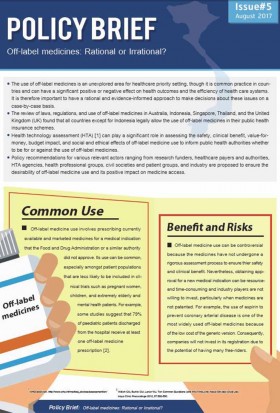This website uses cookies so that we can provide you with the best user experience possible. Cookie information is stored in your browser and performs functions such as recognising you when you return to our website and helping our team to understand which sections of the website you find most interesting and useful.
Policy Brief (Issue 5): Off-label medicines: Rational or Irrational?

Details
The use of off-label medicines is an unexplored area for healthcare priority setting, though it is common practice in countries
and can have a significant positive or negative effect on health outcomes and the efficiency of health care systems.
It is therefore important to have a rational and evidence-informed approach to make decisions about these issues on a
case-by-case basis.
The review of laws, regulations, and use of off-label medicines in Australia, Indonesia, Singapore, Thailand, and the United
Kingdom (UK) found that all countries except for Indonesia legally allow the use of off-label medicines in their public health
insurance schemes.
Health technology assessment (HTA) [1] can play a significant role in assessing the safety, clinical benefit, value-for money,
budget impact, and social and ethical effects of off-label medicine use to inform public health authorities whether
to be for or against the use of off-label medicines.
Policy recommendations for various relevant actors ranging from research funders, healthcare payers and authorities,
HTA agencies, health professional groups, civil societies and patient groups, and industry are proposed to ensure the
desirability of off-label medicine use and its positive impact on medicine access.




